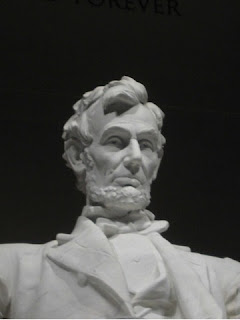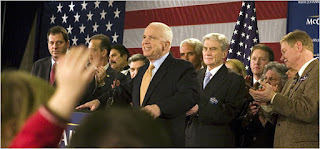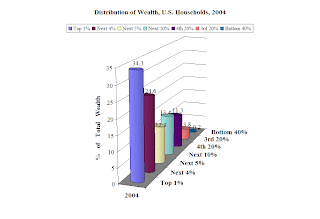
One complaint about McCain on the right is his co-sponsorship of the McCain-Feingold Act that limited spending by big money on campaigns. A prominent rallying cry against the act is the claim that it is unconstitutional because it restricts freedom of speech.
The courts have given us, and have upheld the notion that campaign financing is an act of Freedom of Speech, protected by the 1st Amendment of the Constitution. But where do we draw a line between "buying an election" and "free speech"? McCain-Feingold answers the call of the people to stop the practice of big business and big money buying elections. This is clearly, on the face of it, a good thing to do. Does it really make sense, in the face of this, to label the practice of spending large amounts of money on campaigns a matter of "free speech"? It doesn't to me.
It is also said that this act was passed into law in an effort to protect incumbents. That makes little sense to me either. True, there is the threat of
 the self-financing candidate, and McCain-Feingold does a lot to limit the self-financing candidate. But that's a good thing to me, because I don't want to see millionaires buying their way into office anymore than I want them buying someone else into office. For the most part, however, it's the challenger who is helped by this act. It's a lot easier for someone in office to be selected as the beneficiary of corporate influence than it is for an unknown to be.
the self-financing candidate, and McCain-Feingold does a lot to limit the self-financing candidate. But that's a good thing to me, because I don't want to see millionaires buying their way into office anymore than I want them buying someone else into office. For the most part, however, it's the challenger who is helped by this act. It's a lot easier for someone in office to be selected as the beneficiary of corporate influence than it is for an unknown to be.Corporations should no right to free speech protection anyway. They should not be considered "persons," even though a corrupt Congress established them as such through the 14th Amendment in 1868. Seeing this coming, Abraham Lincoln said:
"Corporations have been enthroned and an era of corruption in high places will follow, and the money power of the country will endeavor to prolong its reign by working upon the prejudices of the people until all wealth is aggregated in a few hands and the Republic is destroyed."Today, the top 20% of wealthiest Americans own over 80% of the nation's wealth. Persons need protection from corporations, and corporations do not deserve protections from persons. There is a balance to be found, of course, in considering the people who are share-holders in, and people who work for corporations. But corporations should not be able to, amongst other things, use the shelter of "free speech" to buy elections and votes.
 As for the individually wealthy, most of whom have benefited from corporate welfare, protection, and vote-buying, they do have a right to "free speech." They can say anything they want. They can argue anything they want. They can influence us through the use of reason. They can even influence us through their advertising schemes and rhetoric. But the buying of elections and votes should never have been protected as "free speech."
As for the individually wealthy, most of whom have benefited from corporate welfare, protection, and vote-buying, they do have a right to "free speech." They can say anything they want. They can argue anything they want. They can influence us through the use of reason. They can even influence us through their advertising schemes and rhetoric. But the buying of elections and votes should never have been protected as "free speech."The protection of the buying of elections and votes under the guise of "free speech" is a transparent attempt to maintain a culture of corruption in our political system.
(You can enlarge the bar graph by clicking on it, or checking out its website of origin.)

No comments:
Post a Comment